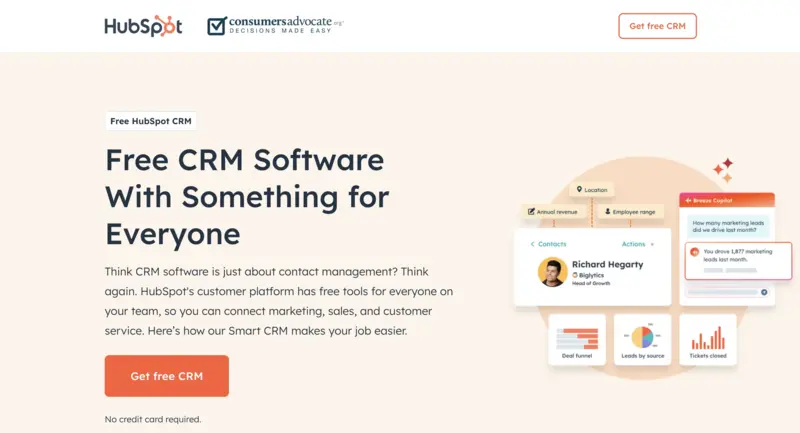Best CRM Software
Based on In-Depth Reviews
-
200+Hours of research
-
22+Sources used
-
11Companies vetted
-
8Features reviewed
-
10Top
Picks

- Integrate several systems for greater efficiency
- Establish a customer strategy before shopping for CRM
- CRM software can assist in sales and marketing
- CRM providers should offer comprehensive customer support
How we analyzed the best CRM Software Providers
Our list of the best CRM Software Providers
- Additional Companies:
- Oracle
- Bigin by Zoho
- Pipedrive
- Monday.com
- HoneyBook
- Keap CRM Software
- Thryv CRM
Our Top Picks: CRM Software Reviews
HubSpot CRM Overview:
HubSpot CRM is a free, all-in-one platform designed to help businesses manage contacts, deals, and customer relationships without complexity. It offers built-in tools for sales, marketing, and service teams, including email tracking, pipeline management, workflow automations, and reporting dashboards. Trusted by over 194,000 customers in more than 120 countries, HubSpot has been consistently recognized by G2 as a leader in CRM software, making it a reliable choice for growing businesses that want scalability, integrations, and enterprise-grade security alongside ease of use.
- Core Capabilities
- Contact & lead management, deal pipelines, company records, task/activity tracking, email & call logging, free-forever core CRM functionality.
- Automations & AI
- Workflow automation (e.g. email sequences, lead routing, follow-ups), smart content automation, AI-driven lead scoring, duplicate detection & merging.
- Integrations
- Native integrations with Gmail, Outlook, Slack; app marketplace + API + Zapier support for connecting to many external tools.
- Post-Sales Management
- Ticketing, customer feedback tools, support workflows, knowledge base capabilities (via Service Hub) to handle service, retention, and support.
- Dashboards & Reporting
- Prebuilt dashboards, custom reporting across sales/marketing/service, revenue forecasts, analytics & data visualization tools.
- Security & Compliance
- Enterprise plans include advanced permissions, single sign-on (SSO), hierarchical team structures. (HubSpot emphasises security and scalable compliance in its enterprise offerings.)
- Pricing & Trial
- Free plan available (core CRM free forever). Paid tiers (Starter, Professional, Enterprise) across hubs. Pricing is modular (you can pick Hubs: Sales, Marketing, Service, etc.)
HubSpot CRM Overview:

monday.com CRM Overview:
monday.com CRM, built on the monday Work OS, helps teams manage every stage of the customer journey—from lead capture and pipeline tracking to post-sale support. With no-code automations, AI assistance, customizable dashboards, and 200+ integrations, it offers flexibility and transparency for growing businesses. Trusted by over 180,000 organizations worldwide and recognized in global rankings like Fortune’s Future 50 and G2’s Best Software Companies, monday.com CRM combines ease of use with enterprise-grade security and compliance.
- Core Capabilities
- Lead & contact management, deal pipelines, account records, activity logging, post-sales tracking.
- Automations & AI
- No-code automations (e.g. assign leads, reminders), email sequences, AI drafting & summarizing, formula automations.
- Integrations
- Native sync with Gmail, Outlook; connect with apps you already use; 200+ preconfigured integrations
- Post-Sales Management
- Manage handoffs, client projects, renewals, collections — not just closing leads.
- Dashboards
- Kanban, timeline, Gantt (via timeline/dependencies), widgets + dashboards to visualize pipeline health & metrics.
- Security & Compliance
- Enterprise plan includes things like audit logs, SAML SSO, and HIPAA (via BAA) where necessary.
- Pricing & Trial
- 14-day free trial. Paid plans (Basic, Standard, Pro, Enterprise). Pricing per seat, annual vs monthly.
HoneyBook CRM Overview:
HoneyBook is a clientflow management and CRM platform designed to help independent businesses and small teams manage leads, projects, contracts, invoicing, and payments in one system. Founded in 2013, it provides workflow automation, integrated payments, and professional client communication tools to streamline operations. The platform is trusted by a large community of entrepreneurs and service-based professionals for its ease of use and all-in-one functionality. HoneyBook has been positively reviewed by reputable software comparison platforms such as Forbes Advisor, G2, and Capterra for usability and client management capabilities.
- Core Capabilities
- Client and project management, lead tracking, proposals and contracts, contact records, centralized communication, customizable templates.
- Automations & AI
- Workflow automations with triggers and conditions, automated emails and tasks, AI-assisted setup for client flows, onboarding and follow-up sequences.
- Integrations
- Native integrations with Gmail, Google Calendar, QuickBooks, Zoom, and Calendly; Zapier support for extended connections.
- Post-Sales Management
- Client communication hub, project tracking, invoicing, payment schedules, feedback and review management.
- Dashboards & Reporting
- Revenue tracking, lead-to-client conversion metrics, payment and income reports, simple analytics dashboards.
- Security & Compliance
- Secure payment processing with encryption, PCI compliance, role-based team access, limited enterprise-level compliance features.
- Pricing & Trial
- 7-day free trial, paid plans from $29/month, unlimited clients and projects, 2.9% + $0.25 card fee or 1.5% ACH fee, discounted rates for high-volume users.

More insight into our methodology
Platform
Customer Relationship Management software should be compatible with current operating systems and platforms. This is to make it easier for businesses to integrate CRM software into their existing office systems.
- Mobile Compatible
- On-premise
- Software as a Service
Customer Management
Customer management features enable businesses to create a database that can be used to support its marketing campaigns. Features can include segmenting, categorizing customers and capturing customer feedback.
Marketing & Lead Generation
CRM marketing and lead generation gives businesses the benefit of increasing sales and conversion by giving tools such as email-based or SMS marketing campaigns. Important marketing features should include Integrated Web Forms, Tags, Social Media Integration and Customizable Reporting. These features provide a solid foundation to build or create marketing and lead generation campaigns.
Generating leads and increasing sales is essential to business growth. To increase sales and productivity, a CRM software must include customer analytics and pipeline management. Lead generation gives businesses the opportunity to focus their resources more effectively.
Reporting & Analytics
Reporting and analytic tools helps track productivity and performance. This is a tool that can be used to study customer data and enables managers to make better and more informed decisions. Reporting is a common feature found in CRM software. This gives businesses a snapshot of business’s activity and performance.
Employee Performance & Tracking
Sales representatives will find CRM software that include tracking tools very helpful. This can help them keep track of sales quotas, incentives, sales numbers and other important metrics. Businesses are also able to track performance and have a summary of their activities and achievements. The system can also be used to keep an eye on orders and competitors.
Integration & Customization
CRM software should support a variety of third-party integrations. This makes it easier to export and import data to and from other office software. This also helps save time by eliminating repetitive tasks.
Support Services
CRM software providers should offer a complete suite of online and offline support services. The company should be able to address concerns in a timely fashion especially in cases of system failures. Customer support through telephone and live chat support enables clients to communicate directly with a customer representative.
- Telephone
- Knowledge Base
- Tutorials
- Forums
- Technical Support
Costs
Helpful information about CRM Software
Customer relationship management (CRM) software is a category of software that covers a wide range of applications designed to help businesses manage customer data and support, access business information, automate sales, track leads, and support vendor/partner relationships. Though it’s most commonly used to facilitate interaction with customers, it can also help manage business contacts, clients, and sales leads.
CRS software is a useful tool to help streamline any sort of business, and some even integrates with other sales and marketing systems, eliminating redundancy and making it quicker to accomplish tasks. Small businesses should look for compatibility features, and software that’s equipped to handle sales, marketing, and employee evaluation. Startups should favor integration and intuitiveness, so the software can grow with the company. Sales teams need classification tools for contacts, and an emphasis on customer interaction with data-tracking features and reports.
Features to look out for when comparing CRM software include ease of use, storage limits, and other requirements, such as number of authorized users. CRM should increase efficiency, secure customer loyalty, sort potential customers, and save money and time by combining several features in one program.
Bear in mind that CRM is generally a lengthy process, and should only be implemented once a customer strategy has been established, and your organization has been optimized for customer focus. Many people assume incorrectly that CRM has to be technologically intensive, but well-functioning CRM programs should focus on low, mid, and high-tech. Finally, make sure that your CRM marketing strategies are tailored to your customer’s tastes and values.
Our CRM Software Review Summed Up
| Company Name | The Best |
|---|---|
| Nimble CRM Software | Best for managing relationships without data entry |
| Elify Shuffle CRM Software | Good choice for capturing new leads |
| Infor CRM Software | Good choice for tracking marketing campaigns |
| Netsuite CRM Software | Best for sales force automation |
| Sugar CRM Software | Features multi-language and multi-currency support |
| Microsoft Dynamics CRM Software | Features a strong CRM solution |



